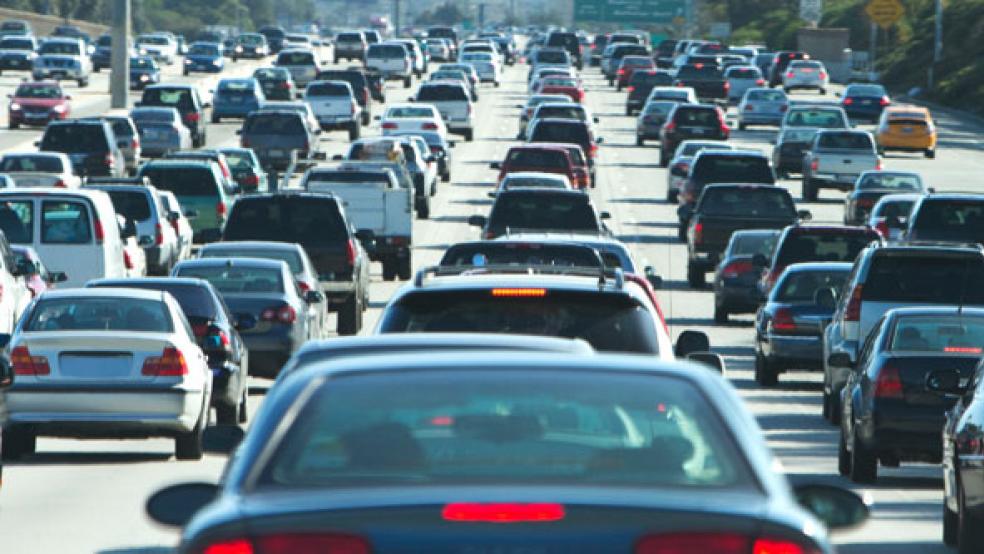Americans are driving less than they used to because of higher gasoline prices, a weak economy and changing generational preferences, according to a report released Tuesday that found a sixty-year "driving boom" had hit the brakes.
The report, by advocacy organizations the U.S. Public Interest Research Group and Frontier Group, said transportation policymakers and existing plans to expand the nation's roads and highways have not taken the decline into account.
The researchers said car use is likely to decline further as members of the Millennial generation, now in their teens to early 30s, move into cities and rely more on public transportation, while car-loving baby boomers age out of their "peak driving" years.
People aged 16 to 34 racked up 23 percent less mileage in 2009 than in 2001, the study said, demonstrating a greater decline in driving than for any other age group.
"This is a new direction - a real break, a real change, the study's co-author, Phineas Baxandall, an analyst at the U.S. PIRG, said in a briefing on Tuesday. "After 2004, on per capita basis, driving has gone down, and the number of vehicle-miles driven has also gone down each year since 2004."
This trend is reflected in vehicle ownership, which has decreased by 4 percent between the all-time high of 1.24 vehicles per driver in 2006 and now.
The percentage of driving-age Americans with licenses also fell to a 30-year low of 86 percent in 2011 from an all-time high of 90 percent in 1992.
RELATED: The 10 Greenest Cars to Buy in 2013
Meanwhile, the average inflation-adjusted price of gasoline doubled between 2002 and 2011. In the short term, the study said, higher fuel prices may lead people to skip long road trips or vacations; in the longer run, sticker shock at the gas station could encourage people to lower or avoid the expense of driving by living closer to work or buying more efficient cars.
The researchers said federal and certain state governments have nevertheless continued to allocate funds to large highway expansion projects based on "obsolete" forecasts "based on assumptions forged during the driving boom," said co-author Tony Dutzik, a policy analyst at the Frontier Group.
"We invest tens of billions of dollars in our transportation systems so it's important that we're doing so with a clear understanding of what we know and don't know about the future," Dutzik said.
The study noted that "the number of miles driven in the heaviest trucks has actually declined faster than overall vehicle travel in recent years, falling by 11 percent between 2007 and 2011." It said there was "little evidence thus far for the proposition that reductions in household driving must coincide with an increase in heavy-duty truck traffic."
Sean McAlinden, chief economist and vice president for research at the Michigan-based non-profit Center for Automotive Research, dismissed the report's findings.
"Younger buyers under 30 are listing financial problems as their reason for not buying new cars," McAlinden said. "If and when the economy recovers, will buy cars at the same rate as other generations."
The reported declines in driving coincide with weakness in the U.S. economy, which emerged from a brutal recession in June 2009 and was still in tepid recovery in 2011. However, driving did not pick up in line with the recovery, Dutzik said.
"That suggests that the recovery of the economy might not necessarily lead to the kinds of increases in driving that we saw in past decades."
The study noted that cycling, walking, light rail and other alternative methods of transportation have gained popularity in recent years: In 2011, Americans took nearly 10 percent more trips via public transportation than they had in 2005.
RELATED: Tesla Races to Success with Electric Model S
Young Americans in their late teens and 20's are less enthralled with the automobile than prior generations and are seen as regarding high-tech devices, including tablet computers and smartphones, as more important status symbols than cars.
That has led major automakers, including General Motors Co., Ford Motor Co. and Toyota Motor Corp. to rework their lineups with different body styles and more tech-savvy features aimed drawing young Americans' interest.




